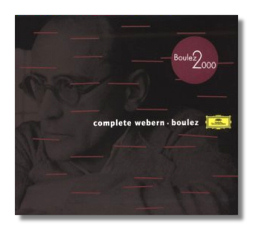
The Internet's Premier Classical Music Source
Related Links
- Webern Reviews
- Latest Reviews
- More Reviews
-
By Composer
-
Collections
DVD & Blu-ray
Books
Concert Reviews
Articles/Interviews
Software
Audio
Search Amazon
Recommended Links
Site News
 CD Review
CD Review
Anton Webern

The Complete Works
- Passacaglia for Orchestra, Op. 1
- Six Pieces for Orchestra, Op. 6
- Fuga (Ricercata) a 6 voci
- Schubert's Twelve German Dances (arr Webern)
- Im Sommerwind
- Five Pieces for Orchestra, Op. 10
- Three Orchestral Songs
- Symphony, Op. 21
- Das Augenlicht, Op. 26
- Cantanta #1, Op. 29
- Variationen für Orchester, Op. 30
- Cantanta #2, Op. 31
- Quintet for Strings and Piano
- Entflieht auf leichten Kahnen, Op. 2
- Two Lieder, Op. 8
- Four Lieder, Op. 13
- Six Lieder, Op. 14
- Five Sacred Songs, Op. 15
- Five Canons, Op. 16
- Three Traditional Rhymes, Op. 17
- Three Lieder for Voice, Clarinet, Guitar, Op. 18
- Two Lieder for Mixed Choir, Op. 19
- Quartet for Violin, Clarinet, Sax, and Piano, Op. 22
- Concerto, Op. 24
- Three Poems
- Eight Early Lieder
- Three Lieder on poems by Ferdinand Avenarius
- Five Lieder on poems by Richard Dehmel
- Five Lieder from "Der siebente Ring" by Stepan George, Op. 3
- Five Lieder on poems by Stefan George, Op. 4
- Four Lieder, Op. 12
- Three Songs from "Viae inviae" by Hildegard Jone, Op. 23
- Three Lieder on poems by Hildegard Jone, Op. 25
- Slow Movement for String Quartet
- Five Movements for String Quartet, Op. 5
- String Quartet (1905)
- Six Bagatelles for String Quartet, Op. 9
- Rondo for String Quartet
- Movement for String Trio, Op. post
- Three Pieces for String Quartet
- String Trio, Op. 20
- String Quartet, Op. 28
- Two Pieces for Cello and Piano
- Movement for Piano
- Sonata Movement (rondo) for Piano
- Four Pieces for Violin and Piano
- Three Little Pieces for Cello and Piano
- Cello Sonata
- Kinderstuck
- Piano piece
- Variations for Piano, Op. 27
Gidon Kremer, Christiane Oelze, Françoise Pollet, et al.
BBC Singers
Emerson String Quartet
Ensemble InterContemporain
Berlin Philharmonic Orchestra/Pierre Boulez
Deutsche Grammophon 457637-2 6CDs
Fifty-five years after his death, Anton Webern still leads listeners through a musical underworld where even dodecaphonic and atonal rules simply don't apply. Hans Bethge's words that Webern set to music apply to many of his compositions: "I lay in a strange land. The moon / spread white radiance before my couch." This "strange land" is filled with tonal wraiths and the "moon" is music suggested but not seen. Perhaps the "white radiance" could refer to those sparse (but oddly satisfying) pieces that are less than a minute long. They comprise the well-known Webern, the one that most of us experience through anthologies, performance, or on the radio.
But there is another Webern that only a boxed set like this can illuminate: The Webern who wrote more vocal pieces than chamber works, for example. His lieder – for which he sometimes wrote the text – is entrancingly sung by sopranos Christiane Oelze and Françoise Pollet, who instinctively sing their way around the harmonic crags. His choral works, canons, and cantatas, some based on poems by Hildegard Jone, contain joyous words that initially clash with the fragmented tone cells, then merge with them. This may be due to the fact that the BBC Singers successfully convey a soothing and mysterious atmosphere. His 8 Early Lieder and 3 Poems, lush late Romantic works, ache with longing. He was not beneath doing work for hire, orchestrating Bach's Fuga and Schubert's German Dances, ironically his most popular work in troubled pre-war Germany and Austria. His wispy forty-eight second Kinderstück is perhaps the world's only children's serialist piano lesson.
In several of the volumes, the genres are grouped chronologically, so that one can experience the progression in Webern's compositional style: Volume 3 starts with his early Schoenberg tribute, the Piano Quintet, and ends with the mystifying Concerto; Volume 5 opens with the gushy Langsammer Satz and ends with the spikey String Quartet, which concludes so abruptly you may want to cue it back.
It's not surprising that all performances are uniformly excellent. Boulez has been practicing (and recording) these pieces for years. Some – I'm not sure all – have appeared on other DGG recordings. But in scope and performance, this Webern is definitive. Get it if you crave works whose flights are as unpredictable as those of Tiger Swallowtails.
Copyright © 2001, Peter Bates


















